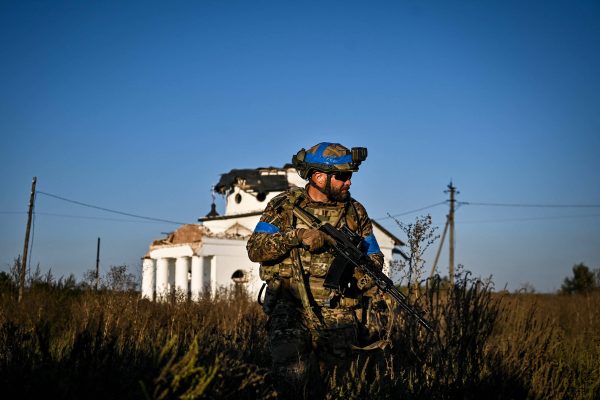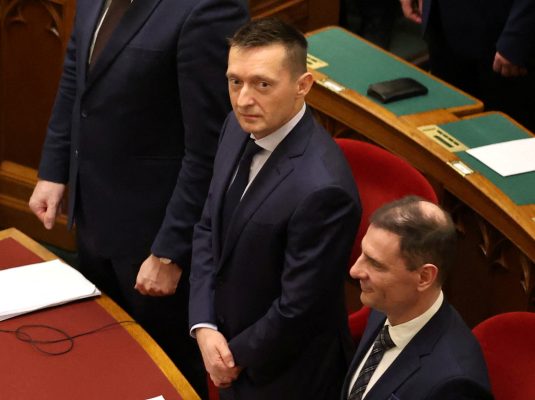It’s a lyrically beautiful, sunny morning in Kyiv and the air raid alarms are sounding. Iranian drones are circling the city, trying to dodge the popping guns of air defenses as they head for their targets. Some miles to the east, Ukrainian troops are engaging North Korean infantry.
To those in the US who argue war in Ukraine is a Europe-only problem, it doesn’t feel like it in Kyiv. It feels like authoritarian regimes are feasting on a democratic state whose allies have failed to recognize the scale of the global threat.
Many on the Western liberal left are in despair at the return of Donald Trump to the White House; there is talk of a historic betrayal and parallels drawn to the Anglo-French sellout of Czechoslovakia in 1938.
But the outlook in Kyiv is far more sanguine. Ukrainians have witnessed too many twists and turns over the past 10 years to be sucker-punched by the latest developments.
“It’s a common opinion here that Trump will move things along,” said Olena Tregub, an anti-corruption advocate. A Ukrainian Defense Ministry official agreed, saying Vice President Kamala Harris’s policies would have meant a slow defeat. A Trump presidency means: “We win big or lose big,” he said.
Ukrainians also point out that Russian President Vladimir Putin has given no signal that he wants anything other than unconditional surrender, and currently thinks he’s winning on the battlefield. That was certainly the message from Moscow after Trump’s victory.
Putin’s spokesman suggested the President-elect needs to change his country’s foreign policy. “Our conditions are unchanged and are well known in Washington,” the foreign ministry said, with its now-characteristic hauteur.
“Trump can’t end the war because he needs Putin to agree,” said Vitaliy Portnikov, perhaps Ukraine’s best-known and most respected commentator. “What will he do if Putin refuses to listen to him? Trump cannot give Putin what Putin wants.”
The US could, of course, sever all US financial and military aid and let Ukraine hang. But Europe would probably continue to support President Volodymyr Zelensky’s government, at least for some time, and the political storm caused by throwing Kyiv to the wolves would be explosive across the West.
So Portnikov disagrees with those (like the extremist Russian academic Alexander Dugin) who say Putin has emerged triumphant. He argues instead that the US result will have been a serious disappointment to the Kremlin. “They expected a disputed election and chaos in American cities,” he said. “This [clear result] is actually a bad outcome for Putin.”
He foresees months of discussion about a peace plan that doesn’t currently exist, along with briefings to US media suggesting something is afoot, and then the collapse of any hope in January.
Those briefings had already begun on November 7. Although the details given were hazy, any discussions assume a Russian willingness to engage, which would be hard to explain for the Kremlin given the abrupt volte-face required.
If the Russian president does play a cleverer game, others see significant risks for Ukraine.
“This could mean the US helping to inflict an unnecessary defeat when we could still achieve a decisive victory,” said Ostap Kryvdyk, chairman of the Ukrainian Strategic Initiative.
Kryvdyk worries US policymakers still think the issue of Russia can be separated from the broadening alliance of authoritarian powers — demonstrated by China, Iran, and North Korea’s involvement in the war — as they seek to end 80 years of Western global dominance.
What about ordinary Ukrainians and their political leadership? A European diplomat in Kyiv said he had seen some despair and some insouciance among the Ukrainians he met, but no panic.
Ordinary people “perhaps express more openly a fear of greater uncertainty over the country’s future, [but] their leaders seem generally reassured by previous contacts in New York,” he said, referring to the September meeting between Trump and Zelensky. “Politicians from all sides express more or less the same hopes.”
Even so, he added, this is a developing story and no one can be sure what will happen next, not even the Kremlin. “The Russians’ cautious reaction to the news tends to confirm this,” he said.
Among educated Ukrainians, the mood is mixed. Many now feel events on the eastern front signal real trouble for the Ukrainian military; and have firsthand news from their relatives fighting there. Things are not going well. A freezing of the lines would not be so bad for Ukraine, a number said in private conversation, because it might give the country the chance to draw breath.
A businessman in the prosthetics industry (manmade arms and legs are now an enormous business in Ukraine) said the war should end as soon as possible. “We can’t go on losing people like this,” he said.
Whatever the difference in opinions, everywhere there is an absolutely clear understanding of how high the stakes are.
“We have learned that if we fight the Russians, we die in thousands,” said Lesia Orobets, a former MP and an advocate for Western assistance. “If we give in to the Russians, we die in millions.”
Francis Harris is Managing Editor at the Center for European Policy Analysis (CEPA) and oversees Europe’s Edge. He was a foreign correspondent with the Daily Telegraph and served in Prague, London, New York, and Washington.
Europe’s Edge is CEPA’s online journal covering critical topics on the foreign policy docket across Europe and North America. All opinions are those of the author and do not necessarily represent the position or views of the institutions they represent or the Center for European Policy Analysis.

CEPA at 20
Celebrating 20 Years of Leadership in Action




